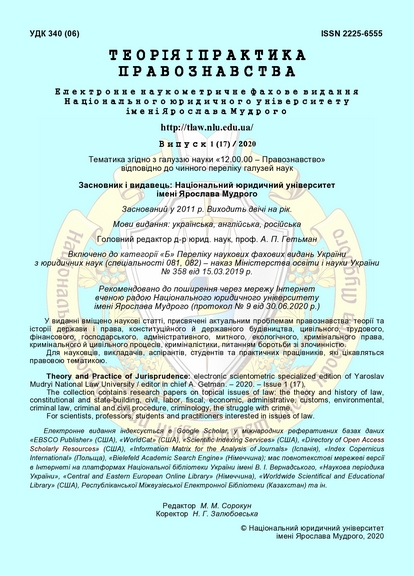Parole from life imprisonment: Ukrainian realities
DOI:
https://doi.org/10.21564/2225-6555.2020.17.206472Keywords:
criminal penalty, grant of parole, life imprisonment, European Court of Human Rights, foreign countries, penal lawAbstract
The article is devoted to the study of the legal regulation of parole in the form of life imprisonment in Ukraine. An analysis of the norms of international acts that regulate this issue, the case law of the European Court of Human Rights and the experience of some foreign countries.
Attention is drawn to the fact that the European Court of Human Rights emphasizes that the existing pardon system in Ukraine is a violation of Art. 3 of the European Convention on Human Rights, and for their harmonization and implementation of the standards referred to in Article 3 of the Convention, the following requirements must be met:
1) those sentenced to life imprisonment must know from the very beginning of their sentence what they must do in order to obtain the right to parole;
2) the convict should not be kept in places of imprisonment if the penological grounds for his further detention have disappeared;
3) the presence of these grounds must be checked within a certain period of time;
4) the release mechanism must have clear criteria and procedural guarantees;
5) the refusal to satisfy the request for parole must be justified.
The hopelessness of the possibilities of releasing persons from criminal liability in Ukraine has been proved. It is stated that the existing institution of pardon in our state is only an exception, it cannot be considered as providing a real prospect of release. Such exclusivity is also directly recognized by the Pardon Regulations, according to which persons convicted of particularly serious crimes may be pardoned only in exceptional cases in the presence of extraordinary circumstances. Given that the Ukrainian legislation does not contain an interpretation of the concepts of «pardon», «early release of persons sentenced to life imprisonment», there are additional difficulties in their enforcement. In addition, the futility of parole in Ukraine is recognized by international institutions such as the European Committee for the Prevention of Torture and Inhuman or Degrading Treatment or Punishment and the European Court of Human Rights. Given all the above, I believe that Ukrainian legislation in this area should be supplemented with rules that will provide a real opportunity for individuals to liberate and achieve the main goal set by the state – to recover and resocialize in society, and thus bring domestic legislation in line with international standardsReferences
Kryminalnyi kodeks Ukrainy. (2001). Vidomosti Verkhovnoi Rady Ukrainy, 25-26, art. 131. URL: https://zakon.rada.gov.ua/laws/show/2341-14.
Kryminalno-vykonavchyi kodeks Ukrainy. (2004). Vidomosti Verkhovnoi Rady Ukrainy, 3-4, art. 21. URL: https://zakon.rada.gov.ua/laws/show/1129-15.
Pro zatverdzhennia Polozhennia pro poriadok zdiisnennia pomyluvannia: Ukaz Prezydenta Ukrainy vid 21.04.2015 r. № 223/2015. URL: https://zakon.rada.gov.ua/ laws/show/223/201.
Kolomiiets, N.V. (2018). Shchodo zastosuvannia umovno-dostrokovoho zvilnennia do osib, zasudzhenykh do dovichnoho pozbavlennia voli. Yurydychnyi visnyk, 3, 178 [in Ukrainian].
Pro umovno-dostrokove zvilnennia: Rekomendatsiia № Rec (2003) 22 Komitetu ministriv Rady Yevropy derzhavam-chlenam 2003 r. URL: https://zakon.rada.gov.ua/ laws/show/994_665 [in Ukrainian].
Pro povodzhennia z osobamy, zasudzhenymy do tryvalykh terminiv uviaznennia: Rezoliutsiia (76) 2 1976 r. URL: http://docs.cntd.ru/document/90199526 [in Ukrainian].
Matioshaitis ta inshi proty Lytvy. URL: http://hudoc.echr.coe.int/eng?i=001-173623 [in Ukrainian].
Sprava «Miurrei proty Niderlandiv». URL: http://hudoc.echr.coe.int/eng?i=001-187626 [in Ukrainian].
Zasudzheni do dovichnoho pozbavlennia voli maiut znaty, yak otrymaty dostrokove zvilnennia. Zakon i Biznes. URL: https://zib.com.ua/ua/print/90549-zasudzheni_do_dovichnogo_pozbavlennya_voli_mayut_znati_yak_o.html [in Ukrainian].
Yevdokimova, O. (2019). Umovno-dostrokove zvilnennia vid dovichnoho pozbavlennia voli u pravi zarubizhnykh krain. Pidpryiemnytstvo, hospodarstvo i pravo. URL: http://pgp-journal.kiev.ua/archive/2019/10/25.pdf [in Ukrainian].
Chovhan, V. (2014). Dovichne vidbuvannia zhyttia, abo zhyttia pislia smerti v Ukraini. URL: http://khpg.org/index.php?id=1392728858 [in Ukrainian].
Pravova pozytsiia Ukrainskoi Helsinskoi spilky z prav liudyny shchodo konstytutsiinosti prypysiv chastyny pershoi statti 81, chastyny pershoi statti 82 Kryminalnoho kodeksu Ukrainy. (2019). URL: https://helsinki.org.ua/wp-content/uploads/2019/ 01/20190111_KSU.pdf [in Ukrainian].
Kharchenko, V.M. (2008). Aktualni problemy pravovoho rehuliuvannia y vykonannia pokarannia u vydi dovichnoho pozbavlennia voli. Problemy zakonnosti, issue 98, 112–120 [in Ukrainian].
Yakovets. I.S., Avtukhov, K.A., Tavolzhanskyi, O.V. (2016). Vypravlennia zasudzhenykh cherez zastosuvannia kryminalnykh pokaran: realii ta perspektyvy. Pravovyi vplyv na nepravomirnu povedinku: aktualni hrani. O.B. Kozachenko, Ye.L. Streltsov (Eds). Mykolaiv, 126–162 [in Ukrainian]
Downloads
Published
How to Cite
Issue
Section
License
Copyright (c) 2020 Theory and practice of jurisprudence

This work is licensed under a Creative Commons Attribution 4.0 International License.




